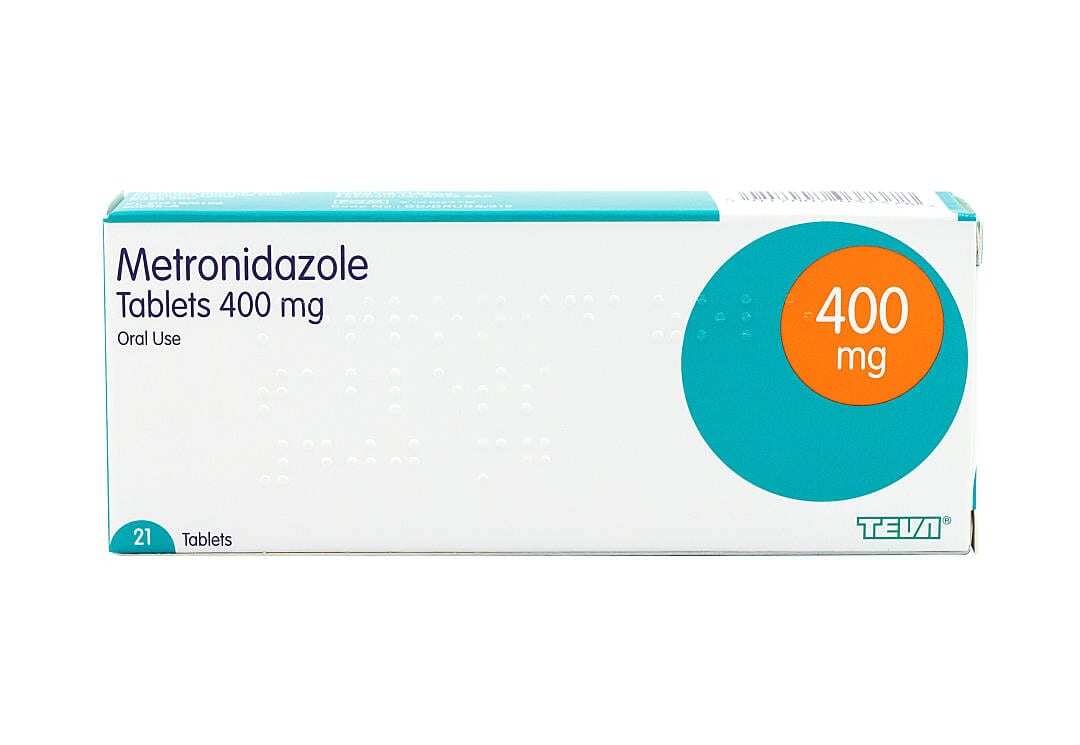What is Metronidazole?
Metronidazole is an antibiotic that belongs to the nitroimidazole class of antibiotics.
It is used to treat bacterial infections in the gastrointestinal tract and parasitic infections such as giardiasis, amoebiasis, and trichomoniasis in humans(1). However, veterinarians also use metronidazole for dogs experiencing inflammatory bowel disease.
With added antiparasitic properties, metronidazole sits apart from any other antibacterial meds, allowing it to treat a wide variety of infections. It is available in the following dosage form: tablet, capsule, and powder for suspension(2).
The extended-release (meaning it is formulated so that the tablet is slowly released in the body) is used to treat women with vaginal infections (bacterial vaginosis). Though it is widely used for treatment, it should be noted that this drug does not work for colds, sore throat, cough, or other virus infections(3).
The most common metronidazole brand in the market is Flagyl, especially the tablet form(4).
How does it work?
The exact mechanism of action of metronidazole is not fully established. After taking metronidazole, it diffuses into the cells of the target organism, stopping the protein synthesis.
The nitro group found in the metronidazole interacts with the susceptible microorganism’s DNA. This results in the disruption of the helical structure and strand breakage. Therefore, causing cell death(5).
Can CBD be taken with Metronidazole?
The CBD-drug interaction is mainly characterized by its effect on the cytochrome P450 system (CYP450), which is found in the liver. These key enzymes are responsible for the metabolism of drugs consumed.
Cannabidiol, on the other hand, acts as a competitive inhibitor of CYP450. This means that CBD draws the attention of these enzymes largely from metabolizing other drugs or compounds(6).
Furthermore, CBD halts the CPY450 action on other substances it would normally metabolise. And this leads to an overall increase in processing time.
On the other hand, antibiotics also utilizes the CYP450 enzyme system. Thus, any antibiotics could interact with CBD since both are using this pathway.
When the CPY450 system is affected this way, it could cause unwanted side effects, subtherapeutic levels, and sometimes overdosage. This is because certain drugs are retained in the system at a higher level(7).
The inhibiting effect of the CBD on the liver function might depend on the amount and form used. However, this is not yet well established.
Can CBD replace Metronidazole?
CBD has been under investigation for years if it has antimicrobial property. One study investigated how cannabinoids affect pathogenic bacteria.
In the said study, each cannabinoid was tested against six strains of the antibiotic-resistant bacteria, the methicillin-resistant Staphylococcus aureus (MRSA). All cannabinoids showed potent activity against a variety of MRSA strains(8).
The result of this study proved that CBD has a potent property in inhibiting the growth of MRSA. A promising result to fight off superbugs in the field of medicine.
Over the years, numerous studies have been conducted to know more about the antibiotic property of CBD. However, there is no known research that suggests CBD as a good replacement for any antibiotics, and as a special interest in this topic, on metronidazole.
Conclusion
The researches show positive results on CBD’s antimicrobial properties. However, there are no known studies that suggest taking antibiotics and CBDs together, nor recommendations that CBD could replace antibiotics medication for the prevention and treatment of antibiotics and antiparasitic meds.
There is still a need to conduct more research to establish the effectiveness of CBD as an antibiotic and antiparasitic.
Until studies that specifically look at how CBD interacts with antibiotics are completed, consult with a doctor to make sure there are no CBD drug interactions with other medications currently taken.
- Weir CB, Le JK. Metronidazole. [Updated 2019 Dec 7]. In: StatPearls [Internet]. Treasure Island (FL): StatPearls Publishing; 2020 Jan-. Retrieved from: https://www.ncbi.nlm.nih.gov/books/NBK539728/?fbclid=IwAR2bAjUSxFalOhs2kxvfztXxi6l6RuM2m7WxMrk8qPqopSfZB-KAwUa78UM
- Mayo Clinic. (01 April, 2020) Metronidazole (Oral Route). Retrieved from: https://www.mayoclinic.org/drugs-supplements/metronidazole-oral-route/description/drg-20064745
- Drug Bank. (June 13, 2005). Metronidazole. Retrieved from: https://www.drugbank.ca/drugs/DB00916#reference-L3754
- ibid.
- Weir et. al. op. Cit.
- Pharmotech SA. CBD Drug Interactions. Retrieved from https://pharmotech.ch/cbd-drug-interactions/.
- ibid.
- Giovanni Appendino, G et al. Antibacterial Cannabinoids from Cannabis sativa: A Structure−Activity Study. Journal of Natural Products 2008 71 (8), 1427-1430. DOI: 10.1021/np8002673.




















